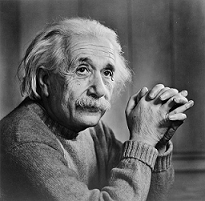EINSTEIN, ALBERT

Albert Einstein (1879-1955), the famous German-American physicist, is widely regarded as one of the greatest and most influential minds in history. Although born into a Jewish family, Einstein was a secularist all his life. But while he had little interest in conventional religion he was a deeply spiritual man, curious about human nature and destiny. In particular he had a quiet appreciation for Buddhism. In one of his essays he wrote: ‘The individual feels the nothingness of human desires and aims and the sublimity and marvellous order which reveal themselves both in nature and in the world of thought. He looks upon individual existence as a sort of prison and wants to experience the universe as a single significant whole. The beginnings of cosmic religious feeling appear in early stages of development – e.g. in many of the Psalms of David and in some of the Prophets. Buddhism ... especially, contains much stronger elements of it.’ Later, in his most detailed comments on religion, Einstein again referred to the Buddha’s teachings: ‘The religion of the future will be a cosmic religion. It should transcend a personal God and avoid dogmas and theology. Covering both the natural and the spiritual, it should be based on a religious sense arising from the experience of all things, natural and spiritual, in a meaningful unity. Buddhism answers this description .... If there is any religion that would cope with modern scientific needs it would be Buddhism.’